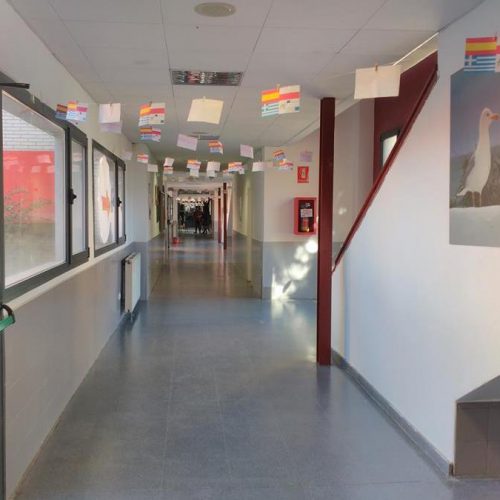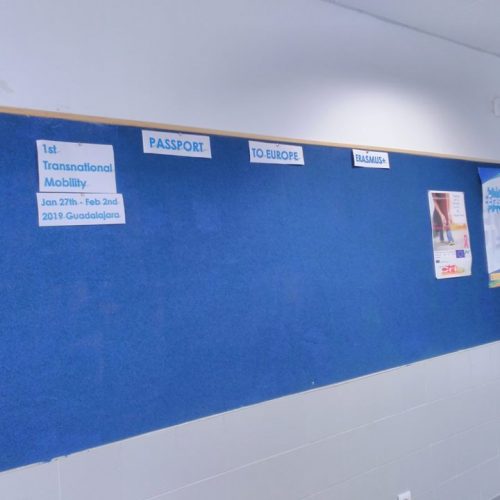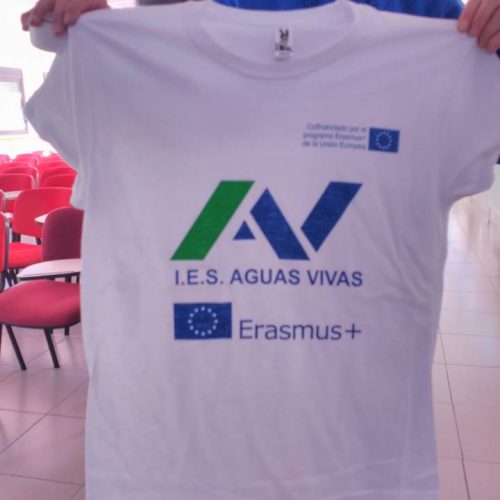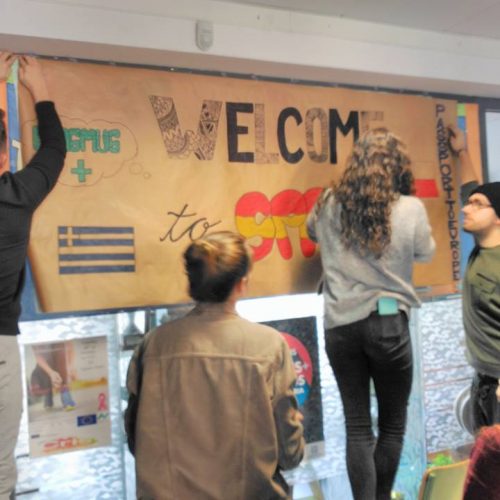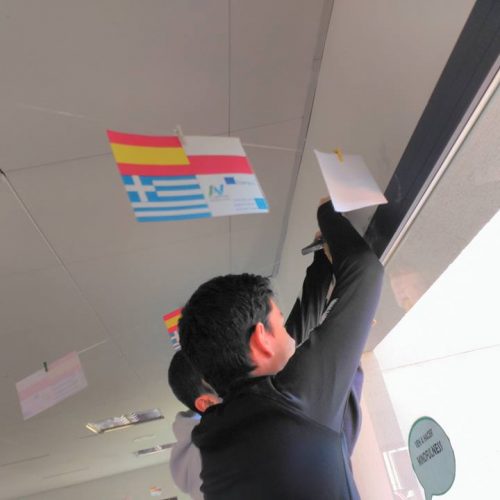PREPARATION FOR THE FIRST MOBILITY IN SPAIN OF OUR PROJECT: “PASSPORT TO EUROPE”
What ideas we had in mind when we organized the miniprojects for our students
At the start of the school year 2018-19, being part of the Erasmus K229 project called Passport to Europe [designed by four schools from between Guadalajara (Spain), Skala (Poland), Chania (Greece) and Heraklio (Greece)], we proposed a project for the Spanish students in which the students participated during class in nine different tasks.The students from other counties would also develop the same projects. Thus, they would open their minds to the diversity of customs of young people from other cultures. Our objective was also that they would value their own Historical Heritage transmitting it to others and immersing in the cultural heritage of other European countries.
We designed 9 activities to be developed in class so that they would be time travellers when they recorded the documentary about the history of Spain; they would become tourist guides of their cities; they would discover a national museum; they would beautify their classrooms and school creating gardens with different types of plants specific to their areas; they would compete in the Olympic games; They would reflect on the stereotypes of these countries; they would enjoy an inclusive race sharing a day with the whole educational community; they would share their experiences in mindfulness, and they would teach their knowledge as cybercriminal experts, practising peer assistance.
In class, when the project was handed out, we used cooperative work to develop each tasks . They worked in teams in each session, collaborating as much as possible within their capacities, and valuing the possibilities and differences of each of their classmates as something good and constructive. This collaborative way of working has enriched them not only academically but it has also prepared them for the world outside the classroom, making them more prosocial and capable of coworking. In every activity we wanted that students learned using English as a vehicular language in a real way. Our focus was also the Historical Heritage of our area, to bring a bit of Europe to our classrooms. All these activities motivated the students a lot.
How we developed the project activities/mini-projects in class with students:
- There was nine activities or mini-projects were developed in class and within our school context.
- We dedicated at least one session/hour a week per teacherduring the school time from September to January to develop the mini projects.
- Three participating teachers developed the activities in their lectures, one hour a week each.
- We adapted the 9 mini-projects to our own context and school peculiarities.
- Students developed all the activities working cooperatively. They worked in teams in each session,
- We developed all the activities in class the months previous to receiving students in the school exchange in January.
- The activities were prepared to be shown during the school exchange to the visitin students. It was then when we showed the visiting students the results and products of our mini-projects.
- We also had meetings with the school families so that they cooked typical food for the school exchange. They cooked typical national dishes and food to be shared with the visiting students and teachers
- We also developed supplementary activitiesto achieve the objectives of the nine mini-projects, such as decoration of the school.
- We also came some afternoons, near the Transnational Meeting, to finish preparing everything.
Project Implementation
Being well-organized and well-coordinated has been very important for us. It has helped us develop the project. To get organized, we did, amongst others, the following tasks:
- We designed and timeline, schedule and calendar for the lifespan of the project
- We designed a of initial tasksincuding all the acitivities and tasks to be developed before the 1st Transnational Meeting
- We held teacher team composition meetings
- We celebrated a meeting with participating students
- We designed of mini projects for students to develop project
- We had a meeting with participating students’ families
- We sent a letter to our school community with info about the project
- We participated in a Team Building Haka for students
- We published information on local newspapers and held a radio review about our project
- Students developed the mini projects in class
- We registered the project in eTwinning
- We created a list of host families for January
- Students published articles on E+ web and FB
- Students started designing and preparing the class gardens with pallets
- Students’ presented the E+ co-woring area
- We prepared for the project logo and hashtag contest for our school
- We created an Erasmus+ area in our corridors
- We prepared and revised the 1st TPM week plan
- We held a second meeting with parents to let them know about the hosting/visiting students
- We held a Videoconference with visiting students
- We designed and bought a roll up
- We had a mock visit to Prado Museum
Preparing the school to welcome visiting students and teachers:
For a good few days we were nervous and very excited preparing the school for the welcoming of the visiting students and teachers. The last few days were hectic: students hanging up flags in corridors and conference hall, putting ups posters and photos, making a big welcome poster and roll up, stacking up chairs and tables, finishing up the co-working area, preparing the t-shirts for the charity race .
apilando las camisetas de la carrera solidaria que han organizado, terminando las medallas que repartirán al alumnado ganador de Los Juegos Olímpicos que han organizado, acabando la zona de difusión Erasmus + (un super corcho pintado de azul donde colocaremos posters, fotos, información E+)…Y las tres profesoras y el profesor artífices de este proyecto (de derecha a izquierda en la foto, Bea, Helena, Javi y Elo) dando una última vuelta a las checklists, asegurándose de que nada falle… o lo menos posible. Mañana a las 12h llega a las puertas el IES el grupo Polaco. Allí estaremos con pancartas y carteles para acogerles y darles la bienvenida… ¡Síguenos esta semana en las redes!
Welcome… etc


